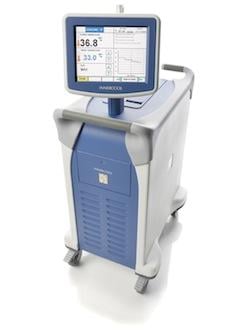
January 16, 2012 — Philips Healthcare announced the enrollment of the first patients in its CHILL-MI clinical study. CHILL-MI is a prospective, randomized, multi-center study designed to further evaluate the safety and effectiveness of the company’s InnerCool RTx endovascular cooling system in patients suffering from ST-elevation myocardial infarction (STEMI). The study will enroll 120 patients at multiple sites in Europe with a primary endpoint of reducing infarct size as a percentage of myocardium at risk, as assessed by cardiac magnetic resonance imaging (MRI). The study will also reinforce the safety and efficacy data demonstrated in the RAPID MI-ICE trial in a larger patient group. The RAPID MI-ICE trial showed a 38 percent reduction in infarct size in STEMI patients who were cooled to a temperature of less than 35° C prior to performing angioplasty.
Acute myocardial infarction (AMI) is the leading cause of mortality in the western world. Following a myocardial infarction, restoring blood flow to the heart is critical to the survival of heart tissue. However, this process may cause additional damage to the heart tissue, known as reperfusion injury. Preventing tissue damage is arguably the most significant unmet medical need in the treatment of AMI and new standards of care are being investigated with the goal of improving patient outcomes.
According to researchers at Lund University in Sweden, one of the study centers, the key to reducing infarct size is to cool patients with therapeutic hypothermia to below 35° C prior to reperfusion or opening of the blocked artery.
"The success of the RAPID MI-ICE study was a breakthrough in the treatment of STEMI patients. With the initiation of CHILL-MI, we aim to confirm the results in a larger multi-center trial. We hope this study will help to demonstrate the positive impact that therapeutic hypothermia can have on the outcomes of patients suffering acute MI and bring us a step closer to making it a standard of care," said David Erlinge, M.D., Ph.D., head, department of cardiology at Lund University in Sweden and principle investigator for the CHILL-MI study.
The potential impact of improving treatment for STEMI is significant. In the U.S., the incidence of STEMI is approximately 77 per 100,000 individuals. In Europe, this rate ranges from 44 to 142 individuals per 100,000 depending on the country, with Turkey having the highest and the U.K. having the lowest rates.
The CHILL-MI study
The Phase II/III CHILL-MI study will enroll 120 patients from multiple centers in Europe. Patients in the treatment group will receive endovascular cooling therapy in combination with 1-2 L of cold saline. The control group will receive the current standard of care. The primary endpoint will be the myocardial infarct size as a percentage of at-risk myocardium at 4 days (± 2 days), as measured by cardiac MRI. Secondary safety and efficacy endpoints will also be evaluated.
The RAPID MI-ICE study
The RAPID MI-ICE study enrolled 20 STEMI patients who were randomized to receive immediate percutaneous coronary intervention with or without adjunct rapid endovascular cooling. The study demonstrated that the induction of mild hypothermia (<35°C) in STEMI patients prior to performing an angioplasty can save up to 38 percent more heart tissue than the current standard of care. Data showed that, in the control group, more patients experienced heart failure (n=3) and ventricular tachycardia/ventricular fibrillation (VT/VF; n=2) than in the endovascular cooling group, which had no instance of either complication (P=0.21). Three patients in the endovascular cooling group experienced infections, while no patients in the control group had infections (P=0.21). The conclusion that the rapid induction of hypothermia with endovascular catheter is safe and feasible in patients with acute MI prompted the initiation of the CHILL-MI study to investigate this technology in a larger multi-center trial.
Background on the Philips InnerCool RTx endovascular cooling system
The Philips InnerCool RTx endovascular cooling system quickly and effectively cools patients from the inside out, even those with high body mass index (>30kg/m2). A catheter with an integrated temperature sensor is placed below the heart via the femoral vein. Once in place, the closed-loop system modulates whole body temperature without fluid introduction or exchange by circulating cool saline in the catheter. This technology offers the fastest cooling rates of any temperature modulation therapy approach.
Use of the Philips RTx endovascular cooling system for the treatment of myocardial infarction is investigational and is not approved for this indication in the U.S.
For more information: www.philips.com/newscenter


 January 05, 2026
January 05, 2026 









